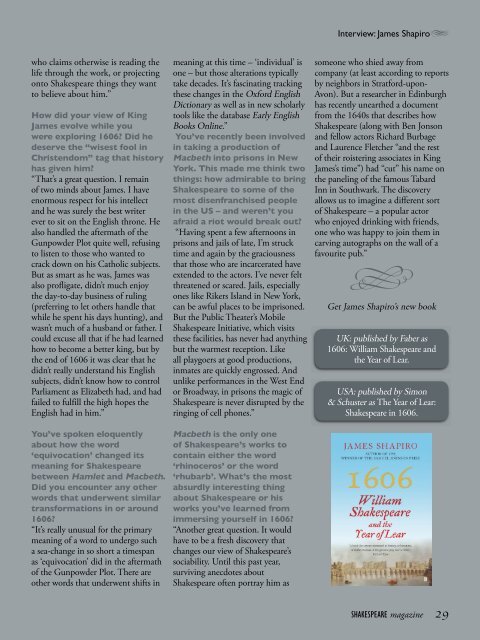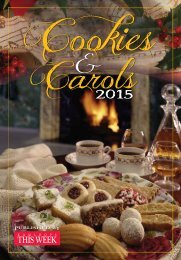Shakespeare Magazine 9
Create successful ePaper yourself
Turn your PDF publications into a flip-book with our unique Google optimized e-Paper software.
Interview: James Shapiro <br />
who claims otherwise is reading the<br />
life through the work, or projecting<br />
onto <strong>Shakespeare</strong> things they want<br />
to believe about him.”<br />
How did your view of King<br />
James evolve while you<br />
were exploring 1606? Did he<br />
deserve the “wisest fool in<br />
Christendom” tag that history<br />
has given him?<br />
“That’s a great question. I remain<br />
of two minds about James. I have<br />
enormous respect for his intellect<br />
and he was surely the best writer<br />
ever to sit on the English throne. He<br />
also handled the aftermath of the<br />
Gunpowder Plot quite well, refusing<br />
to listen to those who wanted to<br />
crack down on his Catholic subjects.<br />
But as smart as he was, James was<br />
also profligate, didn’t much enjoy<br />
the day-to-day business of ruling<br />
(preferring to let others handle that<br />
while he spent his days hunting), and<br />
wasn’t much of a husband or father. I<br />
could excuse all that if he had learned<br />
how to become a better king, but by<br />
the end of 1606 it was clear that he<br />
didn’t really understand his English<br />
subjects, didn’t know how to control<br />
Parliament as Elizabeth had, and had<br />
failed to fulfill the high hopes the<br />
English had in him.”<br />
You’ve spoken eloquently<br />
about how the word<br />
‘equivocation’ changed its<br />
meaning for <strong>Shakespeare</strong><br />
between Hamlet and Macbeth.<br />
Did you encounter any other<br />
words that underwent similar<br />
transformations in or around<br />
1606?<br />
“It’s really unusual for the primary<br />
meaning of a word to undergo such<br />
a sea-change in so short a timespan<br />
as ‘equivocation’ did in the aftermath<br />
of the Gunpowder Plot. There are<br />
other words that underwent shifts in<br />
meaning at this time – ‘individual’ is<br />
one – but those alterations typically<br />
take decades. It’s fascinating tracking<br />
these changes in the Oxford English<br />
Dictionary as well as in new scholarly<br />
tools like the database Early English<br />
Books Online.”<br />
You’ve recently been involved<br />
in taking a production of<br />
Macbeth into prisons in New<br />
York. This made me think two<br />
things: how admirable to bring<br />
<strong>Shakespeare</strong> to some of the<br />
most disenfranchised people<br />
in the US – and weren’t you<br />
afraid a riot would break out?<br />
“Having spent a few afternoons in<br />
prisons and jails of late, I’m struck<br />
time and again by the graciousness<br />
that those who are incarcerated have<br />
extended to the actors. I’ve never felt<br />
threatened or scared. Jails, especially<br />
ones like Rikers Island in New York,<br />
can be awful places to be imprisoned.<br />
But the Public Theater’s Mobile<br />
<strong>Shakespeare</strong> Initiative, which visits<br />
these facilities, has never had anything<br />
but the warmest reception. Like<br />
all playgoers at good productions,<br />
inmates are quickly engrossed. And<br />
unlike performances in the West End<br />
or Broadway, in prisons the magic of<br />
<strong>Shakespeare</strong> is never disrupted by the<br />
ringing of cell phones.”<br />
Macbeth is the only one<br />
of <strong>Shakespeare</strong>’s works to<br />
contain either the word<br />
‘rhinoceros’ or the word<br />
‘rhubarb’. What’s the most<br />
absurdly interesting thing<br />
about <strong>Shakespeare</strong> or his<br />
works you’ve learned from<br />
immersing yourself in 1606?<br />
“Another great question. It would<br />
have to be a fresh discovery that<br />
changes our view of <strong>Shakespeare</strong>’s<br />
sociability. Until this past year,<br />
surviving anecdotes about<br />
<strong>Shakespeare</strong> often portray him as<br />
someone who shied away from<br />
company (at least according to reports<br />
by neighbors in Stratford-upon-<br />
Avon). But a researcher in Edinburgh<br />
has recently unearthed a document<br />
from the 1640s that describes how<br />
<strong>Shakespeare</strong> (along with Ben Jonson<br />
and fellow actors Richard Burbage<br />
and Laurence Fletcher “and the rest<br />
of their roistering associates in King<br />
James’s time”) had “cut” his name on<br />
the paneling of the famous Tabard<br />
Inn in Southwark. The discovery<br />
allows us to imagine a different sort<br />
of <strong>Shakespeare</strong> – a popular actor<br />
who enjoyed drinking with friends,<br />
one who was happy to join them in<br />
carving autographs on the wall of a<br />
favourite pub.”<br />
<br />
Get James Shapiro’s new book<br />
UK: published by Faber as<br />
1606: William <strong>Shakespeare</strong> and<br />
the Year of Lear.<br />
USA: published by Simon<br />
& Schuster as The Year of Lear:<br />
<strong>Shakespeare</strong> in 1606.<br />
SHAKESPEARE magazine 29











